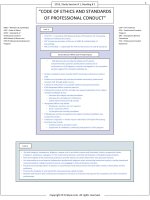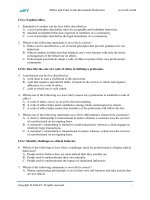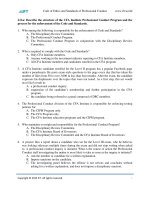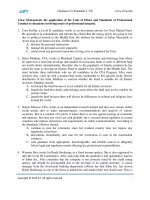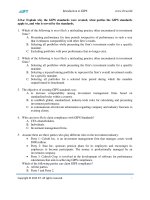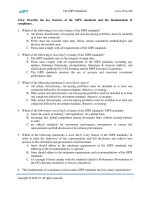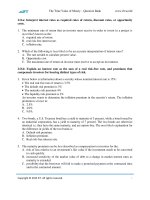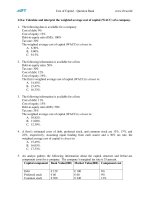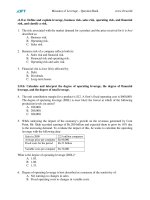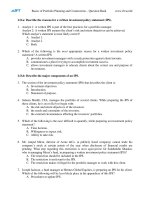CFA 2018 quest bank r02 code of ethics and standards of professional conduct q bank
Bạn đang xem bản rút gọn của tài liệu. Xem và tải ngay bản đầy đủ của tài liệu tại đây (192.06 KB, 8 trang )
Code of Ethics and Standards of Professional Conduct
www.ift.world
LO.a: Describe the structure of the CFA Institute Professional Conduct Program and the
process for the enforcement of the Code and Standards.
1. Who among the following is responsible for the enforcement of Code and Standards?
A. The Disciplinary Review Committee.
B. The Professional Conduct Program.
C. The Professional Conduct Program in conjunction with the Disciplinary Review
Committee.
2. Who is required to comply with the Code and Standards?
A. Only CFA Institute members.
B. Anyone working in the investment industry reporting to CFA Institute members.
C. All CFA Institute members and candidates enrolled in the CFA program.
3. A CFA Institute candidate enrolled for the Level II program has a popular Facebook page
under a pseudonym. He posts exam-style questions to his page every day that has taken the
number of likes from 50 to over 3,000 in less than four months. After the exam, the candidate
expresses his displeasure over the topics that were not tested. As a first step, this act would
most likely result in:
A. a professional conduct inquiry.
B. suspension of the candidate’s membership and further participation in the CFA
program.
C. the candidate being referred to a panel composed of DRC members.
4. The Professional Conduct division of the CFA Institute is responsible for enforcing testing
policies for:
A. The CIPM Program only.
B. The CFA Program only.
C. The CFA Institute education programs and the CIPM program.
5. Who maintains oversight and responsibility for the Professional Conduct Program?
A. The Disciplinary Review Committee.
B. The CFA Institute Board of Governors.
C. The Disciplinary Review Committee and the CFA Institute Board of Governors.
6. A proctor files a report about a candidate who sat for the Level III exam, who he believes
was looking sideways multiple times during the exam and did not stop writing when asked
to. A professional conduct inquiry is initiated. What is the course of action the Professional
Conduct staff investigating the matter is most likely to take as soon as the inquiry is initiated?
A. Ask the member or candidate for a written explanation.
B. Impose sanctions on the candidate.
C. The investigating panel believes the offense is not serious and concludes without
asking for a written explanation, and does not impose a disciplinary sanction.
Copyright © 2015 IFT. All rights reserved.
1
Code of Ethics and Standards of Professional Conduct
www.ift.world
7. Which of the following is not the result of a sanction imposed by CFA Institute?
A. Public censure.
B. Revocation of the CFA charter.
C. Termination of employment if the firm claims compliance with the Code and
Standards.
LO.b: State the six components of the Code of Ethics and the seven Standards of
Professional Conduct.
8. According to the CFA Institute Code of Ethics, which one of the following is incorrect?
Members and Candidates must:
A. Act with integrity, competence, diligence, and respect and in an ethical manner with
the public, clients, prospective clients, employers, employees and other participants in
the global capital markets.
B. Place the integrity of the investment profession and the interests of clients at par with
their own interests.
C. Use reasonable care and exercise independent professional judgment when
conducting investment analysis, making investment recommendations, taking
investment actions and engaging in other professional activities.
9. According to the CFA Institute Code of Ethics, which of the following statements is correct?
Members and Candidates must:
A. Act with honesty, efficiency, thoroughness, and in an ethical manner with the public,
clients, prospective clients, employers, employees and other participants in the global
capital markets.
B. Refrain from encouraging others to act in a professional and ethical manner that will
reflect credit on the employer and the profession.
C. Promote the integrity and viability of the global capital markets for the ultimate
benefit of society.
10. According to the CFA Institute Code of Ethics, which of the following statements is least
likely correct? Members and Candidates must:
A. Place the integrity of the investment profession and the interest of clients above their
own personal interests.
B. Maintain and improve their professional competence and strive to create a
competitive environment for other investment professionals.
C. Use reasonable care and exercise independent professional judgment when
conducting investment analysis, making investment recommendations, taking
investment actions, and engaging in other professional activities.
11. Which of the following is not a Standard of Professional Conduct?
A. Efficiency of capital markets.
B. Professionalism.
C. Duties to clients.
Copyright © 2015 IFT. All rights reserved.
2
Code of Ethics and Standards of Professional Conduct
www.ift.world
12. Which one among the following is a Standard of Professional Conduct?
A. Duties to Capital Markets.
B. Equity Analysis, Recommendations, and Actions.
C. Conflicts of Interest.
13. Which one among the following is not a Standard of Professional Conduct?
A. Duties to Employers.
B. Responsibilities as a CFA Institute Member or CFA Candidate.
C. Communication with Employers.
14. According to the CFA Institute Code of Ethics, which of the following statements is correct?
Members and Candidates must:
A. Promote the integrity and efficiency of the global capital markets for the ultimate
benefit of society.
B. Promote the integrity and efficiency of the global capital markets for the ultimate
benefit of investors.
C. Promote the integrity and viability of the global capital markets for the ultimate
benefit of society.
15. Promote the integrity and viability of the global capital markets for the ultimate benefit of
society. According to the CFA Institute Code of Ethics, which of the following statements is
correct? Members and Candidates must:
A. Use independence and exercise discretion when conducting investment analysis,
making investment recommendations, taking investment actions, and engaging in
other professional activities.
B. Use reasonable care and exercise independent professional judgment when
conducting investment analysis, making investment recommendations, taking
investment actions, and engaging in other professional activities.
C. Use independence and objectivity when conducting investment analysis, making
investment recommendations, taking investment actions, and engaging in other
professional activities.
LO.c: Explain the ethical responsibilities required by the Code and Standards, including
the sub-sections of each Standard.
16. The Standards of Practice Handbook is most likely to require a member to disclose which of
the following to clients and prospective clients?
A. Guidelines of CFA Institute Standards of Professional Conduct.
B. The use of outside advisers to manage various portions of clients’ assets.
Copyright © 2015 IFT. All rights reserved.
3
Code of Ethics and Standards of Professional Conduct
www.ift.world
C. A one-time investment loss that occurred after disclosure of certain risks of
investment.
17. According to the Standards of Practice Handbook, which of the following statements about
Performance Presentation is least accurate?
The Standard related to performance
presentation requires members and candidates :
A. to ensure that the investment performance information is fair, accurate, and complete.
B. to deal fairly and objectively with all clients when providing investment analysis,
making investment recommendations, or taking investment action.
C. To avoid misrepresenting past performance to clients and prospective clients.
18. According to the Standards of Practice Handbook, members and candidates must outline to
clients significant limitations and risks associated with the investment process. The
disclosure would least likely include:
A. the risks associated with the use of complex financial instruments.
B. any changes that materially affect the investment processes used to analyze
investments and select securities.
C. relevant information on factors important to investment analyses and
recommendations in plain language.
19. According to the Standards of Practice Handbook, members are most likely required to
disclose to clients their:
A. ownership of stock in companies they recommend to clients.
B. information on the Professional Conduct Statement.
C. the screening steps used to select stocks.
20. According to the Standards of Practice Handbook, a member has to protect the interests of
his firm, refraining from any conduct that would deprive it of profit, or his skills and ability.
If the member fails, he violates the CFA Institute Standards of Professional Conduct related
to:
A. Duties to Clients.
B. Loyalty.
C. Responsibilities of Supervisors.
21. Which of the following statements is most accurate according to the Standards of Practice
Handbook? Members and Candidates must:
A. deal fairly and objectively with all clients when providing investment
recommendations, taking investment action, or engaging in other professional
activities.
B. ensure that anyone under their supervision complies only with the Code and
Standards.
C. not accept gifts, benefits or compensation if it creates a conflict with their employer’s
interest unless they obtain a written consent from all parties involved.
Copyright © 2015 IFT. All rights reserved.
4
Code of Ethics and Standards of Professional Conduct
www.ift.world
22. A failure to reveal information about a client involved in drug trafficking is most likely a
violation of:
A. Preservation of confidentiality.
B. Loyalty, prudence and care.
C. Disclosure of conflicts.
23. Which of the following statements is most accurate according to the Standards of Practice
Handbook? Members and Candidates:
A. who possess nonmaterial nonpublic information that could affect the value of an
investment must not act or cause others to act on the information.
B. who possess material nonpublic information that could affect the value of an
investment must not act or cause others to act on the information.
C. who possess nonmaterial public information that could affect the value of an
investment must not act or cause others to act on the information.
24. Which of the following statements is most accurate according to the Standards of Practice
Handbook? Members and Candidates:
A. may engage in practices to boost the liquidity of an illiquid stock.
B. must not engage in practices to artificially inflate trading volume.
C. are not prohibited from creating rumor campaigns on blogs and social media outlets
with the intent of pumping prices.
25. Which Standard requires members and candidates responsible for managing a portfolio to a
specific mandate, strategy, or style, to make investment recommendations or take investment
actions that are consistent with the stated objectives and constraints of the portfolio?
A. Standard III(C) Suitability.
B. Standard V(A) Diligence and Reasonable Basis.
C. Standard III(A) Loyalty, Prudence and Care.
26. Which of the following statements is most accurate according to the Standards of Practice
Handbook? Members and Candidates:
A.
must keep information about current, former, and prospective clients confidential
if it concerns illegal activities on the part of the client or prospective client unless
disclosure is required by the law.
B.
must disclose information about current, former, and prospective clients
confidential if it concerns illegal activities on the part of the client or prospective
client irrespective of whether disclosure is required by the law.
C.
must keep information about current, former, and prospective clients confidential
if it concerns illegal activities on the part of the client or prospective client unless
clients or prospective clients permit disclosure.
27. Which Standard relates to distinguishing between fact and opinion in the presentation of
investment analysis and recommendations?
Copyright © 2015 IFT. All rights reserved.
5
Code of Ethics and Standards of Professional Conduct
www.ift.world
A. Standard V(C) Record Retention.
B. Standard V(A) Diligence and Reasonable Basis.
C. Standard V(B) Communication with Clients and Prospective Clients.
28. A member gets verbal consent from his employer before accepting a 7-day vacation for him
and his family at his client’s private villa in southern Spain, including travel in a private jet as
it is in a remote location. This was in appreciation for the outstanding performance of his
client’s portfolio. Did the member violate any Standard?
A. No.
B. Yes, Standard IV(A) Loyalty.
C. Yes, Standard IV(B) Additional Compensation Arrangements.
29. Which Standard requires Members and Candidates to disclose to their employer, clients, and
prospective clients, as appropriate, any compensation, consideration, or benefit received from
or paid to others for the recommendation of products or services?
A. Standard VI(C) Referral Fees.
B. Standard IV(B) Additional Compensation Arrangements.
C. Standard IV(A) Loyalty.
30. Which Standard requires Members and Candidates to make full and fair disclosure of all
matters that could reasonably be expected to impair their independence and objectivity or
interfere with respective duties to their clients, prospective clients, and employer?
A. Standard VI(A) Disclosure of Conflicts.
B. Standard IV(A) Loyalty.
C. Standard I(B) Independence and Objectivity.
Copyright © 2015 IFT. All rights reserved.
6
Code of Ethics and Standards of Professional Conduct
www.ift.world
Solutions
1. C is correct. The Professional Conduct Program, in conjunction with the Disciplinary Review
Committee, is responsible for the enforcement of the Code and Standards.
2. C is correct. All CFA Institute members and candidates enrolled in the CFA program are
required to comply with the Code and Standards.
3. A is correct. A professional conduct inquiry will be initiated.
4. C is correct.
5. B is correct. The CFA Institute Board of Governors maintains oversight and responsibility
for the Professional Conduct Program.
6. A is correct. Continuing to write after the final call is an offense taken seriously and it is
likely that an investigation will be carried out by the Professional Conduct staff.
7. C is correct. Sanctions include public censure, suspension of membership, use of the CFA
designation, and revocation of the CFA charter.
8. B is correct. According to the CFA Code of Ethics: “Place the integrity of the investment
profession and the interests of clients above their own personal interests” and not at par with
their own interests.
9. C is correct. A is incorrect because the Code of Ethics talks about integrity, competence,
diligence, and respect. B is incorrect because members and candidates must not only practice
themselves but also encourage others to practice in a professional and ethical manner that
will reflect credit on themselves and the profession.
10. B is correct. The Code of Ethics does not talk about creating a competitive environment. The
focus is on maintaining and improving the professional competency of self and others in the
profession.
11. A is correct. It is Integrity of Capital Markets, not Efficiency of Capital Markets.
12. C is correct. B is incorrect because it is Investment Analysis, Recommendations, and
Actions. A is incorrect because it is Duties to Clients and Duties to Employers.
13. C is correct. Communication with clients and prospective clients is a substandard under
Investment Analysis, Recommendations, and Actions.
14. C is correct. Refer to the Code of Ethics.
Copyright © 2015 IFT. All rights reserved.
7
Code of Ethics and Standards of Professional Conduct
www.ift.world
15. B is correct. Refer to the Code of Ethics.
16. B is correct. According to Standard V(B) Communication with Clients and Prospective
Clients members should inform their clients about the expertise provided by the external
advisers.
17. B is correct. Refer to Standard III(D) Performance Presentation.
18. C is correct. Refer to Standard V(B) Communication with Clients and Prospective Clients.
19. A is correct. Refer to Standard VI(A) Disclosure of Conflicts.
20. B is correct. Refer to Standard IV(A) Loyalty.
21. C is correct. A is incorrect because they must deal fairly and objectively with all clients, not
just fee-paying clients. B is incorrect they must comply with applicable laws, not just
domestic laws.
22. A is correct. Members and Candidates must reveal information when required by the law, or
when the client is involved in illegal activities.
23. B is correct. Refer to Standard II(A) Material Nonpublic Information.
24. B is correct. Refer to Standard II(B) Market Manipulation.
25. A is correct. Refer to Standard III(C) Suitability.
26. B is correct. Refer to Standard III(E) Preservation of Confidentiality.
27. C is correct. Refer to Standard V(B) Communication with Clients and Prospective Clients.
28. C is correct. The member failed to obtain written consent and a gift such as is this might
potentially create a conflict of interest.
29. A is correct. Refer to Standard VI(C) Referral Fees.
30. A is correct. Refer to Standard VI(A) Disclosure of Conflicts.
Copyright © 2015 IFT. All rights reserved.
8
